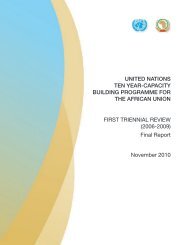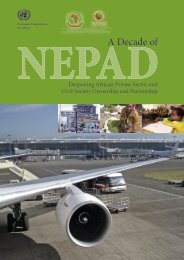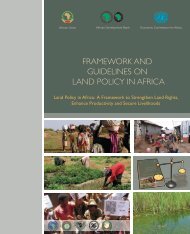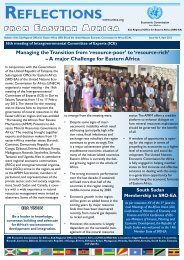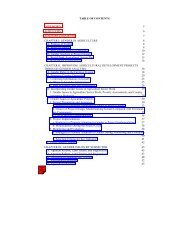English - Economic Commission for Africa
English - Economic Commission for Africa
English - Economic Commission for Africa
Create successful ePaper yourself
Turn your PDF publications into a flip-book with our unique Google optimized e-Paper software.
Meeting Report: Experts Group Meeting on Implementation of NEPAD<br />
and Ten-Year Capacity Building Programme <strong>for</strong> the <strong>Africa</strong>n Union<br />
nity. This is illustrated by improvements in the coherence and coordination<br />
of support from development partners, as well as the establishment<br />
of common <strong>Africa</strong>n positions on major global issues. Furthermore,<br />
through NEPAD, continental programmes have been developed across a<br />
wide range of sectors, with their respective levels of implementation at<br />
various stages. He stressed that, despite this achievement, NEPAD continues<br />
to face several challenges in its implementation that are structural,<br />
political and economic in nature.<br />
Discussants<br />
13. Mr. Gengezi Mgidlana, and Professor Peter Ewang were the discussants<br />
<strong>for</strong> this session. Mr. Mgidlana underscored the need <strong>for</strong> any review<br />
of NEPAD to be based on assessing the initial philosophy, principles and<br />
plan of the programme. It was also important to review the enabling<br />
environment, including the roles of key AU institutions. Essentially, the<br />
achievements should be linked to NEPAD priorities. He acknowledged<br />
that there were difficulties in attributing some achievements solely to<br />
NEPAD as other actors were equally working towards <strong>Africa</strong>’s development.<br />
The objectives of TYCBP-AU as well as linkages with RCM-<strong>Africa</strong><br />
also need to be clearly presented in the draft report. In conclusion, he<br />
stressed that along with the importance of TYCBP-AU being linked to the<br />
priorities of NEPAD, its implementation should be inclusive, involving all<br />
stakeholders, including NPCA and RECs.<br />
14. Professor Ewang, while acknowledging that several variables contributed<br />
to the implementation of NEPAD, emphasized that the draft<br />
report should be re-oriented to focus on the impact of capacity on the<br />
achievement of NEPAD objectives and the role of the TYCBP-AU going<br />
<strong>for</strong>ward. In essence, capacity-building should be the central focus of the<br />
report.<br />
General discussion<br />
15. The discussion generally echoed the views of the two discussants.<br />
Other issues raised included the following:<br />
i. The draft report should adopt a historical and comparative approach,<br />
and avoid case studies, wherever possible, in order not<br />
7



